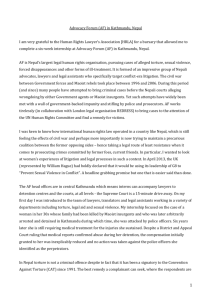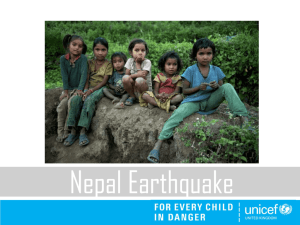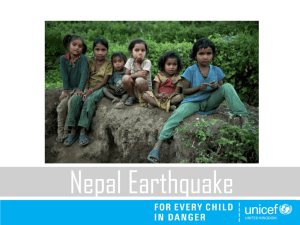The Human Rights Situation of Nepal
advertisement
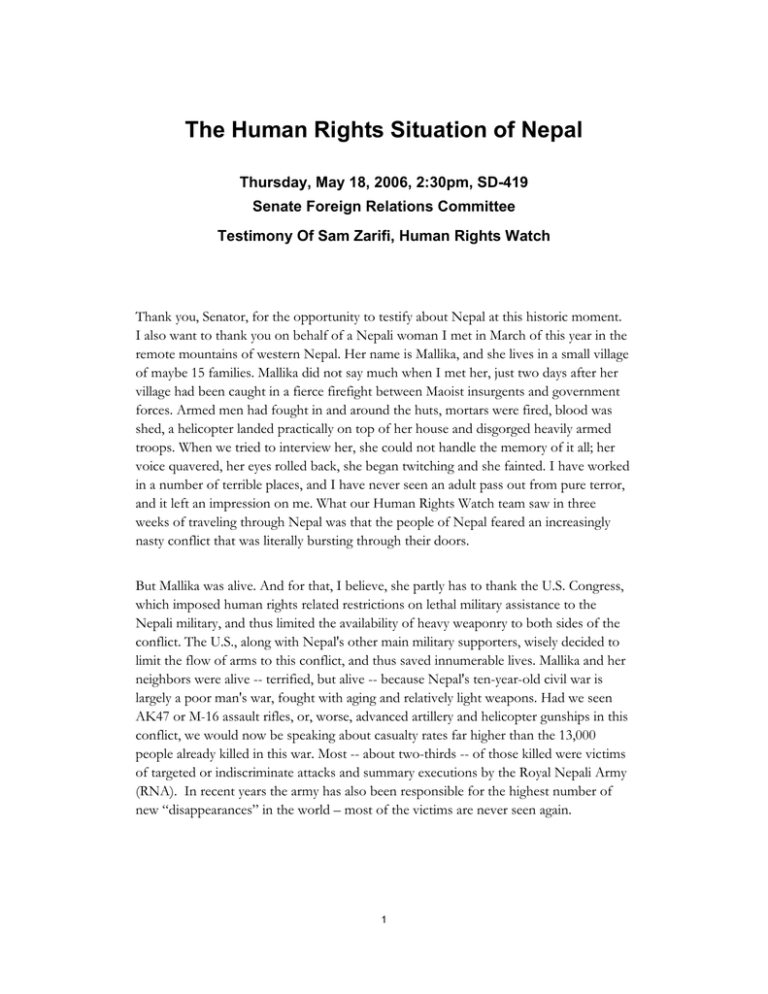
The Human Rights Situation of Nepal Thursday, May 18, 2006, 2:30pm, SD-419 Senate Foreign Relations Committee Testimony Of Sam Zarifi, Human Rights Watch Thank you, Senator, for the opportunity to testify about Nepal at this historic moment. I also want to thank you on behalf of a Nepali woman I met in March of this year in the remote mountains of western Nepal. Her name is Mallika, and she lives in a small village of maybe 15 families. Mallika did not say much when I met her, just two days after her village had been caught in a fierce firefight between Maoist insurgents and government forces. Armed men had fought in and around the huts, mortars were fired, blood was shed, a helicopter landed practically on top of her house and disgorged heavily armed troops. When we tried to interview her, she could not handle the memory of it all; her voice quavered, her eyes rolled back, she began twitching and she fainted. I have worked in a number of terrible places, and I have never seen an adult pass out from pure terror, and it left an impression on me. What our Human Rights Watch team saw in three weeks of traveling through Nepal was that the people of Nepal feared an increasingly nasty conflict that was literally bursting through their doors. But Mallika was alive. And for that, I believe, she partly has to thank the U.S. Congress, which imposed human rights related restrictions on lethal military assistance to the Nepali military, and thus limited the availability of heavy weaponry to both sides of the conflict. The U.S., along with Nepal's other main military supporters, wisely decided to limit the flow of arms to this conflict, and thus saved innumerable lives. Mallika and her neighbors were alive -- terrified, but alive -- because Nepal's ten-year-old civil war is largely a poor man's war, fought with aging and relatively light weapons. Had we seen AK47 or M-16 assault rifles, or, worse, advanced artillery and helicopter gunships in this conflict, we would now be speaking about casualty rates far higher than the 13,000 people already killed in this war. Most -- about two-thirds -- of those killed were victims of targeted or indiscriminate attacks and summary executions by the Royal Nepali Army (RNA). In recent years the army has also been responsible for the highest number of new “disappearances” in the world – most of the victims are never seen again. 1 The Maoists have also been responsible for many civilian deaths, and added to civilian casualties by repeatedly placing their forces in highly populated areas. They have murdered numerous local officials and alleged opponents to their cause, and engaged in widespread torture, intimidation, and extortion of people living in areas under their control. In many areas they forced every household to provide them with at least one person; where no adult was available, children, often girls, were forced to join the Maoist ranks. It was this awful and seemingly intractable conflict that provided the justification for King Gyanendra's takeover of all executive authority on February 1, 2005. He created another human rights crisis on top of the existing brutalities of war. He tried to shut down Nepal's fledgling but vibrant civil society, to silence political opposition, to shut down Nepal's brave journalists, and imprison students, party activists, and human rights defenders. He did all this with the support of the Royal Nepali Army, ostensibly to give the army the free hand it needed to defeat the Maoists. As you know, King Gyanendra failed in all respects. The Maoists gained ground, in real terms and in political terms -- not because of their growing strength, but because the king was his own worst enemy. At the same time, Nepal's people found their voice, as never before, and a few weeks ago forced the king to give up his bid for absolute monarchy and acknowledge the sovereignty of the people. This was a genuine victory of “people power,” no less astonishing than the revolutions that swept away the Iron Curtain or removed dictatorships in the Philippines and Indonesia. The Seven-Party Alliance (SPA) that opposed the king has taken over government, and it has pursued a policy of bringing the Maoists into the political fold, pursuant to the 12-point agreement agreed upon by the parties, and established a mutual ceasefire with the Maoists. Mallika and millions of Nepalese are more hopeful about their futures today because of these events, but they are aware that they've merely stopped -- for now -- the slide toward the precipice. They are rightly anxious about inching away from disaster and eventually establishing a society firmly rooted in the will of the people and accountable to the people. The conflict was driven by longstanding human rights abuses, so the response also needs to address these abuses. The pressure brought to bear by the United States and other members of the international community was quite important in supporting this historic moment. I would like to highlight some human rights issues that should be of concern as you consider how the U.S. government addresses Nepal in the future. 2 First, the United States should help support a legitimate, representative civilian government: support the rule of law. Press the government to remove draconian laws that violate fundamental due process, such as the Public Safety Act and the Terrorism and Disruptive Activities (Control and Punishment) Ordinance, better known by its acronym, TADO. Both laws have been abused by successive governments, including by the present SPA government, which has used these laws to imprison five members of the king's cabinet without proper charges or due process. At the same time, steps have to be taken to address the status of hundreds of detainees held under the Public Safety Act and TADO, many of whom are held without adequate charges, but some of whom are suspected of serious wrongdoing. support a successful constituent assembly. A genuinely representative constituent assembly requires elections that are, and are seen to be, fair and legitimate. This is not just a question of technical matters, such as distributing ballots throughout Nepal's difficult terrain. It requires a campaign of public education as well as monitoring to ensure that people can express their opinions and cast their votes free of intimidation. It requires the Maoists allowing real political activity in areas under their control, and allowing unfettered media access and operation. It means ensuring that the Royal Nepali Army, and any of its associated vigilante groups, do not interfere with the campaigning or voting processes. support efforts to revise Nepal's constitution and legal system in order to remove barriers against Nepal's marginalized groups, in particular, castes. Governmental commissions dedicated to improving the position of Dalits (socalled untouchables) and women should be given constitutional status, similar to the National Human Rights Commission. The United States should support the National Human Rights Commission to regain its independence and expand its capacity to monitor and defend human rights across the country. support efforts to place the RNA under civilian authority. Today Nepal’s Parliament approved a resolution that strips the king of his command of the RNA. The resolution will be voted on as a series of laws in a few days. The RNA has shown through its conduct that it is not a fit interlocutor with the international community, and in particular the United States. It has been responsible for widespread human rights abuses during the conflict, including most of the "disappearances," and it has intruded in civilian government by supporting the king's February 1 coup and by usurping administrative authority in the provinces. The United States should not resume transfer of lethal military materiel to the RNA until and unless a legitimate civilian Nepali government requests the aid and until the RNA demonstrates that it is a disciplined, 3 accountable force. If the United States is interested in providing any assistance to the military, we suggest it concentrate on strengthening the Ministry of Defense's capacity to provide real oversight and control over the uniformed military. The Unified Command, through which the RNA controlled the police force, should be dismantled, and police should return to the job of policing and protecting the populace. Second, the United States should help support efforts to limit, and possibly end, the conflict. support efforts to monitor the ceasefire agreement between the government and the Maoists. Currently, both sides have declared a ceasefire, but similar pauses in the fighting in the past have ended in bloody confrontations. Any ceasefire should give the Nepali people a true respite. The presence of UN human rights monitors has led to real improvements in the behavior of both parties; there is every reason to believe that a robust international monitoring presence will similarly bolster the chances for real human rights improvements during a ceasefire. support accountability for abuses committed in the context of the conflict by both sides. There is precedent in Nepal for an independent, high-level factfinding commission; such a commission should gather information about abuses by both sides, and immediately begin the process of bringing to justice those in the RNA responsible for human rights abuses, and prepare for accountability for Maoist cadres. Despite rhetoric to the contrary, the RNA has failed to impose serious accountability for the serious violations such as extrajudicial executions and "disappearances." Just yesterday we saw large demonstrations in Kathmandu calling for information about the whereabouts of the "disappeared," indicating the significance with which the Nepali people view this problem. Furthermore, address the impunity from prosecution troops have long had for human rights abuses, and assist the reform of the military and civilian justice systems. in particular, support the immediate reintegration into society of thousands of children currently serving as Maoist cadres. The Maoists' use of child soldiers constitutes a serious violation of international human rights. Human Rights Watch interviewed several children recently conscripted by the Maoists -- some of them who had “volunteered” after being subjected to years of propaganda, others forcibly taken under the program of "one household, one fighter," and some of them simply kidnapped. Yet all these children were afraid to return to their homes, afraid that they would be taken again, or punished for failing [unclear what “punished for failing” means]. Sadly, the government of Nepal has neither the policy nor the facility for helping these children reintegrate into civilian life. 4 Third, the United States should help address the injustices and inequalities that have fueled the conflict. The Nepali civil war has been much more a result of real social fissures, not ethnic, religious, or regional grievances. Unless these problems are addressed, the discontent that fueled the conflict will remain. Bilateral donors and international financial institutions are now being requested by the Nepali Finance Ministry to provide budget support and resume full donor aid. Unless aid is programmed transparently and in a participatory manner, it will merely repeat the problems of the past and at worst, contribute to human rights violations. U.S. Treasury and State Department must coordinate so that U.S. representatives on the Boards of the IMF, Asian Development Bank and World Bank prioritize a role for civil society, the media and other institutions in monitoring aid and budget support. U.S. bilateral aid and the IFIs should also support institutions that can contribute to human rights and accountability, such as the judiciary, the national Human Rights Commission, and the anti-corruption commission. Human rights groups should be asked to monitor development project to ensure that human rights violations do no impede access to services. Such monitoring did not occur in the past, leading agencies such as the World Bank to downplay the impact of the conflict and human rights situation on development in Nepal. In addition, the IFIs should prioritize a review of expenditures by the Nepali government to ensure that there is proper oversight in future budget support. In its bilateral program and in its role with multilateral organizations, the U.S. should strive to include Dalit, ethnic and women's groups in decision-making for development programs. 5

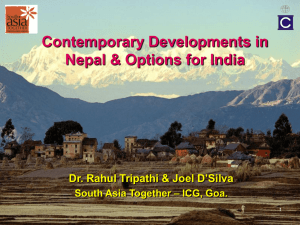

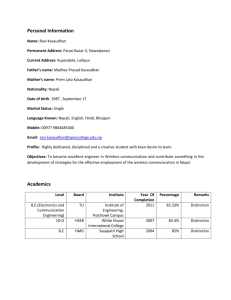
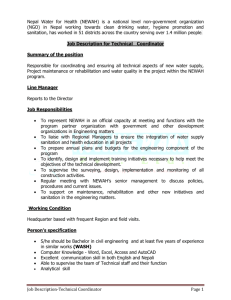
![goodorbaddoc[2].](http://s3.studylib.net/store/data/007716732_2-c358dd078f9663c053518be34422f53d-300x300.png)
